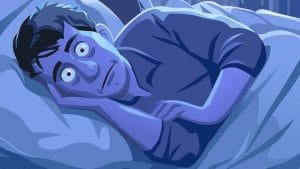
I honestly do not remember the last decent night’s sleep I had. That’s not saying I haven’t spent a lot of time in my bed, it’s just not spent sleeping. Since starting the antidepressants my sleep pattern has been rather erratic, to say the least. This is one of the side effects of the medication. I will often still be awake at 3 or 4 in the morning the telly on. If you asked the next day what I had watched then I wouldn’t have a clue. None of it very taxing on the mind just background noise to keep me company.
When I do go to bed I use the Calm app. There are guided meditations and sleep stories in the app. I also do mindful breathing exercises to help me get to sleep. It is not so much the getting to sleep that’s an issue it is the staying asleep. Actually getting a decent amount of restorative sleep.
Insomnia

I am averaging about 4 hours sleep in total most nights. This is far from perfect and only compounds the other issues that I currently have. I know the things I should do to create a better sleeping pattern and regime. Again its an area I have neglected recently, I know the answers, I advise and tell people what they should do. I have listed below what we all know and what is advised for better sleep patterns. Yes, I am the worse person for actually following my own advice. I’m currently in a rut and the only person that can get me out is myself.
It is all part and parcel of my mental health journey, the journey that I am on right now. If by journaling my journey and openly speaking of the issues I have now helped just one person then that to me is a result.
Quick Sleep Tips
Follow these tips to establish healthy sleep habits:
- Keep a consistent sleep schedule. Get up at the same time every day, even on weekends or during vacations.
- Set a bedtime that is early enough for you to get at least 7 hours of sleep.
- Don’t go to bed unless you are sleepy.
- If you don’t fall asleep after 20 minutes, get out of bed.
- Establish a relaxing bedtime routine.
- Use your bed only for sleeping and sex.
- Make your bedroom quiet and relaxing. Keep the room at a comfortable, cool temperature.
- Limit exposure to bright light in the evenings.
- Turn off electronic devices at least 30 minutes before bedtime.
- Don’t eat a large meal before bedtime. If you are hungry at night, eat a light, healthy snack.
- Exercise regularly and maintain a healthy diet.
- Avoid consuming caffeine in the late afternoon or evening.
- Avoid consuming alcohol before bedtime.
- Reduce your fluid intake before bedtime.